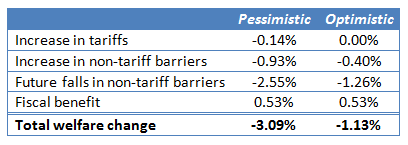Should the UK stay or go? The economic consequences of Britain leaving the EU
How would a British exit from the EU affect the UK’s economy? Swati Dhingra, Gianmarco Ottaviano and Thomas Sampson outline the economic consequences of a Brexit, writing that reduced integration with EU countries is likely to cost the UK economy far more than is gained from lower contributions to the EU budget.

Credit: Gwenael Plaser, CC BY NC 2.0
The direction of UK trade policy with its biggest trade partner – the EU – will be decided in the upcoming general election. The Conservatives are committed to holding an ‘in-or-out’ referendum on membership by 2017 while Labour and the Liberal Democrats have opposed this, but how would Britain’s exit from the EU affect the UK economy and the income of UK citizens?
Brexit would harm the UK economy primarily by reducing trade with EU countries. Leaving the EU would also prevent the UK from benefiting from future free trade agreements negotiated by the EU, such as the Transatlantic Trade and Investment Partnership currently being negotiated with the United States. Finally, Brexit would reduce the attractiveness of the UK for foreign companies.
Jumping off the trade train
The best understood channel through which Brexit would affect the UK economy is via changes in UK trade. EU membership has reduced trade barriers between the UK and EU countries, leading to increased trade. When the UK joined the European Economic Community in 1973, just over 30 per cent of UK exports went to the EU. By 2008, over 50 per cent of UK exports went to EU countries (see Figure 1).
Figure 1: Share of UK trade with EU countries
 Note: Data covers trade with Austria, Belgium, Denmark, Finland, France, Germany, Greece, Ireland, Italy, Luxembourg, Netherlands, Portugal, Spain and Sweden.
Note: Data covers trade with Austria, Belgium, Denmark, Finland, France, Germany, Greece, Ireland, Italy, Luxembourg, Netherlands, Portugal, Spain and Sweden.
Using a quantitative model of the global economy, we analyse two scenarios for how leaving the EU would affect trade costs:
- An optimistic scenario, in which the UK continues to have a free trade agreement (FTA) with the EU much like Switzerland and Norway currently do through the European Free Trade Association (EFTA).
- A pessimistic scenario, in which the UK is not able to negotiate such favourable terms and there are larger increases in trade costs.
Table 1 summarises the results of our analysis for the impact of changes in trade barriers on incomes in the UK. In the optimistic scenario, there is an overall welfare loss of 1.1 per cent, which is driven by current and future changes in non-tariff barriers. Non-tariff barriers play a particularly important role in restricting trade in service industries such as finance and accounting, an area where the UK is a major exporter.
In the pessimistic scenario, the overall loss swells to 3.1 per cent, with most of the impact coming from non-tariff barriers (2.55 per cent). Leaving the EU would increase non-tariff barriers to trade (arising from different regulations, border controls, etc.) and reduce the UK’s ability to participate in future steps toward deeper integration in the EU. The costs of reduced trade far outweigh the fiscal savings. In cash terms, the loss is £50 billion in the pessimistic scenario and a still substantial £18 billion in the optimistic scenario.
Table 1: The effect of a ‘Brexit’ on UK welfare (static gains)
Note: Welfare measured by change in real consumption in the UK. Source: Ottaviano et al, 2014.
While the estimates of Table 1 directly relate to tariff and non-tariff barriers to welfare, they do not account for the dynamic gains from trade such as productivity growth from trade and the impact of other channels (such as FDI and transaction costs). Baier et al find that after controlling for other determinants of bilateral trade, EU member states trade 40 per cent more with other EU countries than they do with members of EFTA. Combining this with estimates that a 1 per cent decline in trade reduces income by between 0.5 per cent and 0.75 per cent implies that leaving the EU and joining EFTA will reduce UK income by 6.3 per cent to 9.5 per cent.
Table 2: The implied changes from leaving the EU and joining the EFTA on UK welfare
Note: Welfare measured as change in per capita consumption in the UK. Source: Ottaviano et al, 2014.
These estimates are much higher than the costs obtained from the static model, which suggests that the dynamic gains from trade are important. To put these numbers in perspective, during the 2008-09 global financial crisis the UK’s GDP fell by around 7 per cent.
Missing the next trade train?
It is sometimes argued that Brexit would allow the UK to increase trade with fast-growing economies such as China and India and with other important trade partners such the US and Japan. Being part of the EU does not restrict the ability of UK companies to trade with the rest of the world, and our analysis above accounts for the effects of Brexit on both trade with the EU and trade with the rest of the world. The EU is currently negotiating major new free trade agreements with the United States and with Japan. If the UK leaves the EU, it will not benefit from these and other FTAs negotiated by the EU in future.
CEP researchers have quantified the impact of recent EU FTAs on consumers in the UK. Consumer prices fell by 0.5 per cent for UK consumers as a result of FTAs negotiated by the EU with trade partners that are not EU members, saving UK consumers £5.3 billion per year. Based on this historical experience, the FTAs with the US and Japan would save UK households £6.3 billion every year. It is unlikely that these benefits would be as high if the UK were to negotiate alone. The size of the EU economy gives it a stronger bargaining position in trade negotiations than the UK would have on its own.
Foreign direct investment and immigration
Two further issues are how Brexit might affect investment and net migration into the UK. Part of the attraction of the UK for foreign companies is as an export platform to the rest of the EU, so if the UK is outside the trading bloc, this position is likely to be threatened. This matters because foreign multinationals tend to be high productivity firms and they bring new technologies and management skills with them. Given the large sunk costs involved in FDI, the uncertainty generated by the possibility of an in-or-out referendum may have a negative impact on investment in the run-up to the vote.
An argument used to support Brexit is that immigration from the EU has harmed UK-born workers in terms of jobs, wages and access to public services. But there is no compelling evidence that these negative effects exist (as shown in CEP’s Election Analysis of immigration and the UK labour market). Economically, migration acts much like trade, as people tend to move to countries where they can be more productive and earn higher incomes, increasing total welfare. Restricting this mobility will, just like restricting trade, reduce overall UK welfare. Di Giovanni et al find that the maximum size of such effects would be a loss of 1.5 per cent of income.
Conclusions
The economic consequences for the UK from leaving the EU are complex. But reduced integration with EU countries is likely to cost the UK economy far more than is gained from lower contributions to the EU budget. Static losses due to lower trade with the EU would reduce UK GDP by between 1.1 per cent in an optimistic scenario and 3.1 per cent in a pessimistic one.
The losses due to lower FDI, less skilled immigration, and the dynamic consequences of reduced trade could also be substantial. Even if the UK maintained full access to the single market following Brexit, it would not have a seat at the table when the rules of the single market are decided. Staying in the EU may cause political trouble for the major parties; but if the UK leaves the EU, the economic trouble will be double.
—
Note: This article is part of the CEP’s series of briefings on the policy issues in the May 2015 UK General Election and originally appeared at our sister site, British Politics and Policy at LSE. The article gives the views of the author, and not the position of Democratic Audit UK, nor of the London School of Economics. Please read our comments policy before posting.
—
 Swati Dhingra is Lecturer in Economics at the LSE.
Swati Dhingra is Lecturer in Economics at the LSE.
 Gianmarco Ottaviano is Professor of Economics at the LSE.
Gianmarco Ottaviano is Professor of Economics at the LSE.
 Thomas Sampson is Lecturer in Economics at the LSE.
Thomas Sampson is Lecturer in Economics at the LSE.







 Democratic Audit's core funding is provided by the Joseph Rowntree Charitable Trust. Additional funding is provided by the London School of Economics.
Democratic Audit's core funding is provided by the Joseph Rowntree Charitable Trust. Additional funding is provided by the London School of Economics.
[…] The economic consequences of the UK leaving the EU are severe, according to Swati Dhingra, Gianmarco Ottaviano and Thomas Sampson. Find out more here. […]
The economic consequences of Britain leaving the EU. GDP down by between 1% to 3% https://t.co/DUyE0x1k0d
Should the UK stay or go? The economic consequences of Britain leaving the EU – https://t.co/kx9hW0pjRm #GoogleAlerts
‘Should the #UK stay or go? The economic consequences of #Britain leaving the #EU’ – https://t.co/wvIwPeBAeP
Economic consequences of Britain leaving the EU, @CEP_LSE #ElectionEconomics briefing @democraticaudit #Brexit: https://t.co/s93amXXI6U
Costs of Brexit are huge even in optimistic scenarios. RT @democraticaudit: economic consequences of GB leaving EU https://t.co/JZKP8dhWjh
Should the UK stay or go? The economic consequences of Britain leaving the EU https://t.co/5iuaISDtSR
Should the UK stay or go? The economic consequences of Britain leaving the EU https://t.co/9vCb1FVhmj